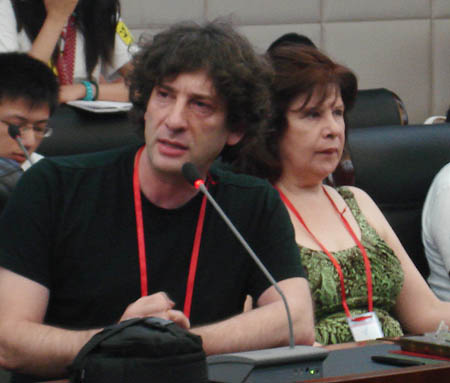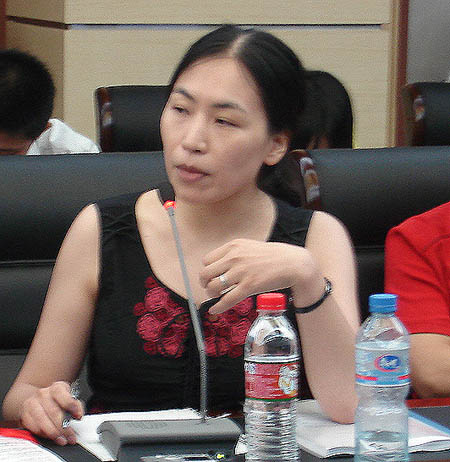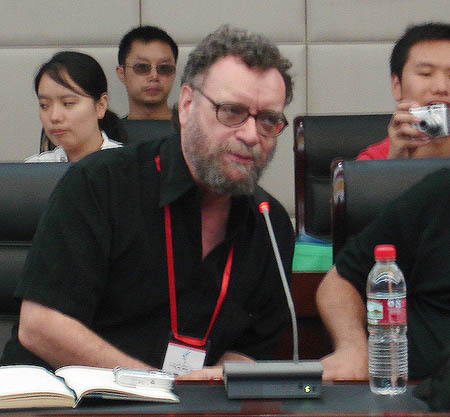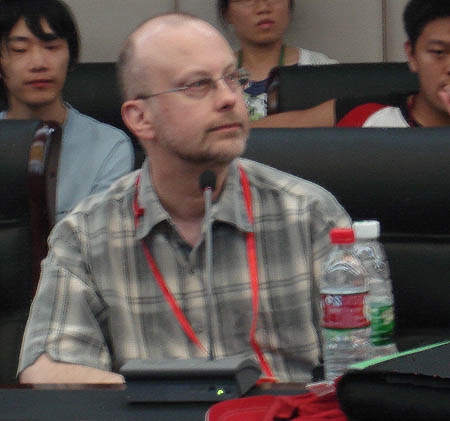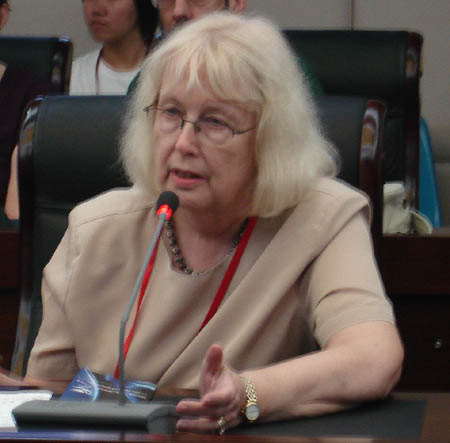Can imagination follow the steps of real-world science? This was the topic for Sunday's Summit Forum on Science Fiction (SF) and Fantasy, part of the 2007 China International Science Fiction and Fantasy Conference in Chengdu. At the gathering, domestic and overseas SF and fantasy writers presented their diversified views on the subject.
Neil Gaiman and Nancy Kress
"I think it's true that the science is drifting farther and farther away from the understanding of the average person. It would be difficult for instance to write a story directly about quantum mechanics," admitted Nancy Kress, noted science fiction writer from the US.
"However, science fiction is about the effect it has on people and not necessarily about the science itself. It is about the way it affects the lives of people. For the science fiction writer, the quantity of scientific breakthroughs is an enormous opportunity. There are thousands and thousands of stories that could be told on the new technology and the new science that is rising from genetics," she continued.
"I think this is a very exciting time to be a science fiction writer and I only wish I could live a thousand years and see how the whole story comes out," she laughed.
Zhao Haihong
Zhao Haihong, a female science fiction writer in China, agreed, saying science fiction has something to do not only with the outer world, but also the inner world; it's not about the technologies, but how the technologies will affect our human lives.
Zhao does not think science fiction should necessarily follow the steps of science.
She said: "Our readers care about the effect science fiction will have on the development of real-world science. However, I think science fiction stories are not the same as scientific stories and it is not necessarily the job of science fiction stories to predict what the world will actually be like in the future. Although many of our science fiction writers can not imagine what would happen in laboratories, we could imagine things that can affect our future life."
Michael Swanwick
Michael Swanwick, another noted science fiction writer from the US, said: "I get such a joy from writing hard science fiction (science fiction that has a lot of scientific factors in it) and getting the science right. But it is important for us to remember that science develops the truth and fiction is not the truth. So the relationship between science fiction and science is always complicated."
Robert Sawyer
Robert Sawyer, noted Canadian science fiction writer, said: "My job as a science fiction writer is not to predict the most likely future but our job is to predict the intriguing, entertaining, or important future that may come true and may not."
Neil Gaiman, a famous UK science fiction writer, specified another type of science fiction story.
He noted: "There are hard science fiction stories where science is a big factor. However, there are also science fiction stories where science is utterly irrelevant and rather how the story relates to people is completely important." He took English writer Gorge Orwell's science fiction story Nineteen Eighty Four for example, pointing out that it doesn't predict what life will be like in the year 1984, on the other hand, it is a warning against the relationship that the government and people could have.
"I think science fiction of all kinds is like a vaccination against the future," he added.
Elizabeth Hull
Elizabeth Hull, ex-chairman of the Science Fiction Research Association of America, emphasized the difference between science fiction and other fiction is that the former predicts the future changes and get people prepared for future shock.
Wang Jinkang
However, Wang Jinkang, a popular science fiction writer in China, downplays the ability for science fiction writers to predict the dramatic changes in the future. However, he said, this unpredictability leaves enough room for imagination.
"No science fiction writers have predicted the amazing functions of the computer in the past, and I think it's rather naïve to use our limited imagination to predict the future," he said.
Another Chinese science fiction writer who did not give him name said: "I think science fiction writers should be observers of science but not participants. The predictability of a science fiction writer is only one of the possibilities and even may be the one that has the least possibility to be realized. But the importance of science fiction stories is that they show us all the possibilities."
"On the other hand, the public only has a simple knowledge about science and they are very pragmatic about science, eager to know how science can benefit them. But science fiction is rational when observing science. They can notice problems that do not currently exist and see what changes they can bring to our society. I think this is what science fiction writers should convey to the readers in their books," he said.
(China.org.cn by staff reporter Yuan Fang, August 27, 2007)

